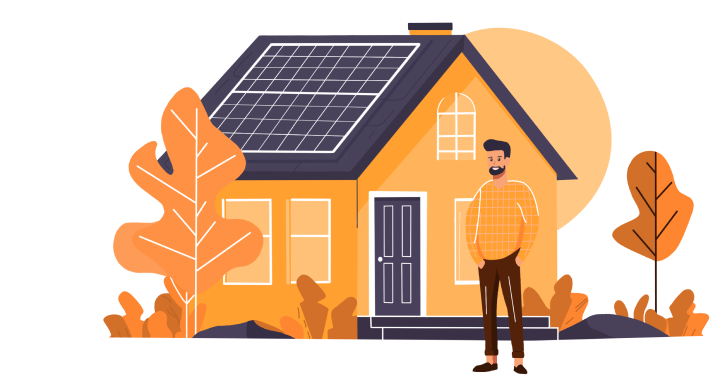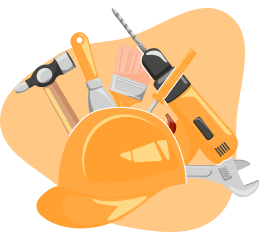Are you considering a home solar system installation to reduce your energy bills and carbon footprint?
In recent years, more homeowners have been seeking solar installation benefits, such as being able to use renewable energy, get solar energy incentives and potentially enjoy long-term savings. However, Solar Energy Host understands that you may be concerned about the upfront costs that come with these.
Don't worry, though. There are ways to help make sure you're getting your money's worth when you're paying for the solar panel installation cost.
In this article, we walk you through some of the best practices to follow when you want to get the most value out of the price you're paying and explore why getting trusted, professional solar installers is recommended if you want a cost-effective home solar system installation experience.
Step #1: Plan and prepare for installation.
What cost savings can you enjoy with solar panels?
In order to maximize the cost-effectiveness of your home solar system installation, you need to know how much you can potentially save by installing solar panels.
Homeowners can typically offset the upfront costs of installations with how much they save on electricity bills during the life of their system. However, your specific savings will hinge on factors like energy consumption, cost per watt, the size of your solar panel system and more.
So, to help make sure your system is a cost-effective investment, you need to make informed installation decisions according to these factors.
How can you check if your roof can accommodate solar panels?
To help ensure your solar power installation is cost-effective, you need to make sure that your roof condition is fit for it.
One way to check is to look out for any cracks or leaks. Doing so will allow you to schedule repairs and prevent any further damage during installation.
It's also important to take note of your roof's angle and orientation. Having this information ready can make working with installers go more smoothly as they can advise you on any additional installation steps to opt for in case your roof angle or orientation isn't optimal for harnessing sunlight.
Addressing these concerns will help optimize your roof for better solar installation performance and durability, which can lead to more savings in the long run.
Step #2: Ensure smooth installation by choosing the right installers.
Choosing the right provider can significantly impact your solar energy savings.
You maximize the cost-effectiveness of the project if your home solar system installation goes smoothly and is done properly.
This is because this lessens the risks of damages and the need for repairs, which usually means having to pay more money. A smooth installation can also mean fewer delays, so you're able to enjoy saving on your electricity bills sooner.
You have to find a reputable but cost-effective solar provider.
If it's your first time installing solar panels, you may feel anxious about having to balance between cost and quality. You don't want to end up with an unreliable installer just because their rates are low. Don't worry, though. Solar Energy Host is here to make home solar system cost comparisons easier.
Enjoy significant savings with Solar Energy Host.
Solar Energy Host is a platform where you can effortlessly compare rates from local solar installers, giving you the power to choose the right option for your budget and needs.
All you have to do is input your location and information about your property and energy consumption, and we'll provide you with a list of competitive quotes from vetted and trusted installers in your area.
This way, you can make informed decisions on which solar power systems prices are the most cost-effective for you while having the assurance that you're choosing from a list of reputable providers.
Step #3: Do simple cleaning and maintenance tasks to retain your panels' efficiency.
Regular maintenance is essential to ensure the long-term efficiency of your solar panels.
Maximizing the cost-effectiveness of your home solar system installation requires ensuring its durability. After all, a long-lasting system means more opportunities for you to offset the initial costs by saving on your electricity bills.
To help ensure the long-term efficiency of solar installations, proper maintenance is a must.
Ensure you check your panels regularly and give them a clean when you notice a buildup. Dust, debris and bird droppings can accumulate on your panels, reducing their ability to absorb sunlight. For more complicated cleaning jobs, though, it's best to hire a professional to take care of it.
Additionally, keep an eye out for any visible damage, loose connections or animal nests that might interfere with the system's operation. If you find any problems, make sure to contact professionals to address them as soon as possible.
Frequently Asked Questions (FAQ)
What are the common misconceptions about solar energy?
A common misconception is that solar panels are ineffective in cloudy or rainy conditions. In reality, solar panels can still produce electricity even during overcast days. They capture indirect sunlight, allowing them to generate power without the need for constant, bright sunlight.
Another common belief is that a rooftop solar panel system can harm your roof's construction. However, if it is done by a professional solar installation company, the integrity of your roof is safe. A reputable installer can assess your roof's condition to see if it is suitable for home solar system installation and has the expertise needed to do the job without damaging your property.
Are there any ongoing costs after installing home solar panels?
To maintain the optimum performance of your home solar system installation, you will need to make some maintenance-related investments.
This includes regular cleaning jobs and damage assessments. Some installers provide ongoing support for a certain amount of time, so make sure to ask your installer if they offer any complimentary maintenance and assessment services.
How do I monitor the performance of my home solar system?
Many solar inverters have built-in monitoring features that let you track the energy production of your residential solar panels. Installing a smart meter may also help you track peak usage, monthly household consumption and other data.
Devices like these help you track how much energy you're generating versus consuming, offering valuable insights into your energy habits and how much you've saved with your home solar system installation.
Your key to reliable home solar solutions
The path to having a home powered by clean energy starts here. At Solar Energy Host, we want you to be able to make the switch to solar power without having to worry about spending weeks reaching out to contractors for quotes one by one. With our platform, you don't have to worry about missing out on great solar deals in your area again.
Discover how much it will cost to install solar panels today!














